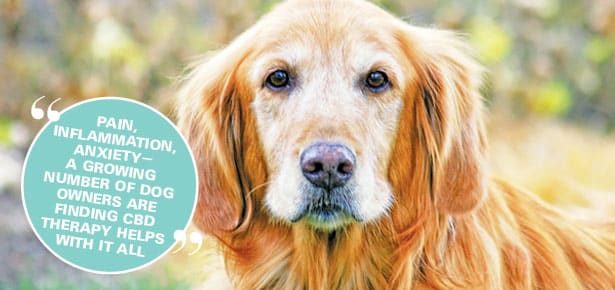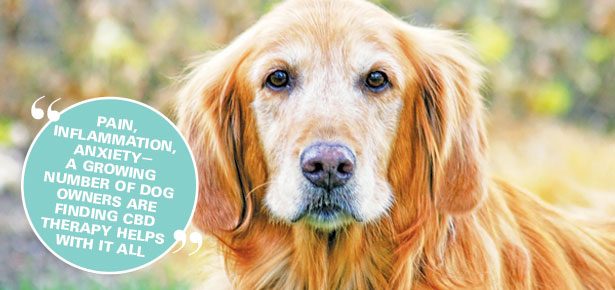

Canine Cannabis
Is CBD Therapy Right For Your Pooch?
Though a three-time cancer survivor, it was ironically arthritis that finally started slowing down Joy Dockrey’s 10-year-old Bull Mastiff, Sammy. The 120-pound senior pooch could no longer jump into the car by himself and was suffering lots of age-related aches and pains.
When the strong painkillers prescribed by Sammy’s veterinarian starting “hurting his gut” and causing stomach issues, Joy, a palliative care counselor for people, sought out a more holistic alternative to traditional pharmaceutical therapies.
“I thought, there has to be something else other than these painkillers that have these severe side effects,” she says.
That’s when Joy discovered what she calls “the magic” of cannabis therapy for pets. She started with cannabidiol or CBD-infused doggie biscuits, later adding a bacon-flavoured CBD tincture to Sammy’s kibble. After introducing CBDs, she says the difference in her dog’s demeanor was dramatic—and almost immediate.
“He’s got more of a spring in his step and a much greater joie de vie. It’s incredible,” she says.
Joy is not alone.
Much like the rise in popularity of medical marijuana treatments for people suffering from pain and disease, more pet owners are turning to these natural treatments to help the ailments of their canine companions.
A quick explainer: CBD or Cannabidiol is a primary component of the cannabis plant. It’s non-psychoactive, which means it does not produce a “high” the way that marijuana does. That’s because it only contains a trace amount of THC—or Tetrahydrocannabinol—the mind-altering chemical in marijuana that produces psychological effects. The plant is non-toxic to pets.
Pet owners using CBD formulations say the products have helped with everything from chronic pain management and arthritis, to seizure disorders and anxiety issues.
Another cannabinoid treatment for animals that’s making waves is THCA. Like CBD, THCA is a non-psychoactive cannabinoid. It’s found in raw and live cannabis and, like CBD, has been reported to help dogs with cancers, ease anxiety, and act as a significant anti-inflammatory and anti-convulsant.
To clear up any potential confusion, THC, which is psychoactive and potentially harmful to dogs in large amounts, and THCA products are not similar, despite having a similar name. When the cannabis plant is heated or cooked, THCA slowly converts to THC, a process called decarboxylation, but THCA, when left in its raw and uncooked state, only has a trace amount of THC, making the products similar in safety to CBD products.
Avery Rose, the founder and owner of Love Grass, a THCA product for dogs, cats, horses, and people which is made with raw uncooked cannabis oil and organic coconut oil, says the therapy is safe and has all the benefits of cannabis without the high.
“We’ve received testimonials of tumours (both benign and malignant) shrinking, animals becoming seizure free, and animals achieving increased mobility caused by inflammation, hip dysplasia and arthritis,” says Rose.
In addition to reducing pain, THCA has also been found to be effective for hot spot relief and curbing car sickness, she adds.
At The Medicinal Cannabis Dispensary in downtown Vancouver, Canada, the demand for pet-specific items has grown so much it recently launched a separate division for pets, with products including a CBD-rich oil meant to relieve inflammation, spasms, and nausea, and dog treats made with CBD, coconut oil, and peanut butter.
“People and animals share the same endocannabinoid system in our brains and nervous system. Cannabis medicines are good for us, so it’s a logical extension that it’s good for our pets,” says founding director and longtime advocate Dana Larsen.
Recommended doses are tied to the animal’s weight. Drops and tinctures are easier to measure than biscuits that need to be cut into pieces for smaller pups.
When used in conjunction with other pain relief, owners can reduce their animal’s dependence on pharmaceutical painkillers, many of which are opioid-based, says Larsen.
Dana touts the therapy for speeding up the recovery of his daughter’s eight-year-old Maltese, Bijou, after spinal surgery.
“She still goes to the vet and was on other medication as well. I just found I was able to lower the dose of the opioid base by offering the cannabis drops,” he says.
But is there science behind the treatment? Well, not much and not yet, which is troubling to many vets faced with clients clamouring to try it out—and asking for advice on dosage.
Because of the current legalities around marijuana in North America there have been few veterinary studies looking at the safe and effective doses for CBD treatments. So with cannabis not legally available for use by veterinarians in North America, at this point the evidence is largely anecdotal.
“There are no studies on the efficacy of the long-term consequences,” says veterinarian Dr. Adrian Walton, owner of the Dewdney Animal Hospital.
It really is the wild, wild west out there right now.
“Without recommended dosage instructions from regulators, it’s also difficult to determine how a dog will metabolize the product,” he adds.
Veterinary colleges are also finding themselves in a unique position of having to take a stance on a treatment that falls in a bit of grey zone legally, even in areas where medicinal marijuana for humans is permitted.
The American Veterinary Medical Association, or AVMA, has not released an official position on CBDs, but has published positive anecdotal testimonials from vets and pet owners on its website, saying the topic warrants more scientific-based research.
Seeing a rise in companies interested in developing oral veterinary products with CBD for companion animals, the Canadian Veterinary Medical Association says “it will still be some time before answers will be available” because research is still in its infancy.
“We acknowledge that we are in the midst of rapid change in this area and will consider developing a position as we move forward,” a spokesperson told Modern Dog in an email.
The Journal of the American Holistic Veterinary Medical Association (JAHVMA) published a survey about CBDs in a 2016 issue. It found that 64.3 percent of dog owners polled felt the consumption of hemp products helped their pets either moderately or a great deal, and relieved medical conditions including inflammation, anxiety, nervous and digestive system problems, nausea and/or vomiting, tumours, convulsions, skin problems, and phobias, including fireworks and thunderstorm fears.
Veterinarians that already prescribe CBD to ailing dogs say it’s a godsend when it’s used in conjunction with a comprehensive treatment plan.
Dr. Maja Kovacevic-MIladinovic of Healing Paws Veterinary Care currently has around three-dozen patients on CBD therapy and she’s pleased with the progress. If your dog has pain symptoms and seizures and you’ve tried conventional therapies, you should consider CBD along with other therapies like acupuncture and laser therapy, she says.
The most success has been seen with dogs experiencing chronic pain, mainly osteoarthritis, as well as with palliative care for canine cancer patients. CBD can even suppress and slow down the growth of cancer cells, she says.
Seizure patients have also made great gains when CBD is added to their diet, reducing the strength and frequency of attacks, she says.
With one dog that had multiple seizures a day, the owners started adding CBD oil and already they’ve seen less seizures, and he’s recovered from them in a much shorter amount of time, she says.
The holistic vet stresses CBD should be considered the same as introducing any other new medication for dogs. Her canine patients are given blood tests beforehand and have regular physical exams during treatment to ensure their safety.
“You have to get it from a reputable source with a vet script and dosage,” she says. “But if you do it right you can see great gains.”
One of her greatest success stories is a 15-year-old Shepherd cross with such severe osteoarthritis and joint pain the owners considered putting him down.
After trying a range of treatments, including laser therapy, acupuncture, and painkillers, they added CBD oil to their dog’s diet.
The dog was walking better in just three days, and when he comes in for his acupuncture sessions, Kovacevic-MIladinovic says it’s like seeing a whole other animal.
“He’s full of life now. He’s able to jump on the bed and they’re going on longer walks,” she says. “It’s definitely improved the dog’s quality of life.
Join the newsletter and never miss out on dog content again!
"*" indicates required fields
By clicking the arrow, you agree to our web Terms of Use and Privacy & Cookie Policy. Easy unsubscribe links are provided in every email.







